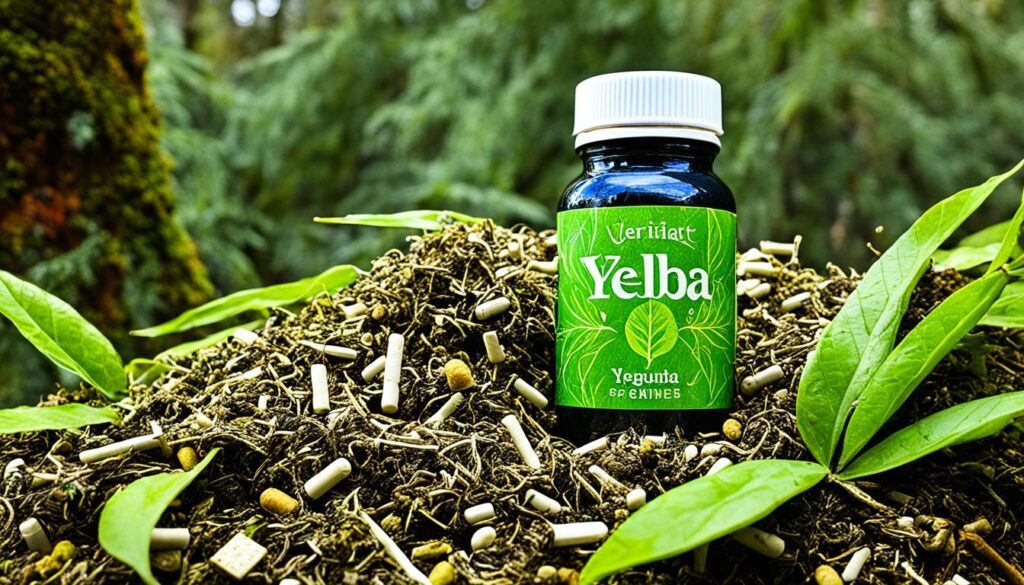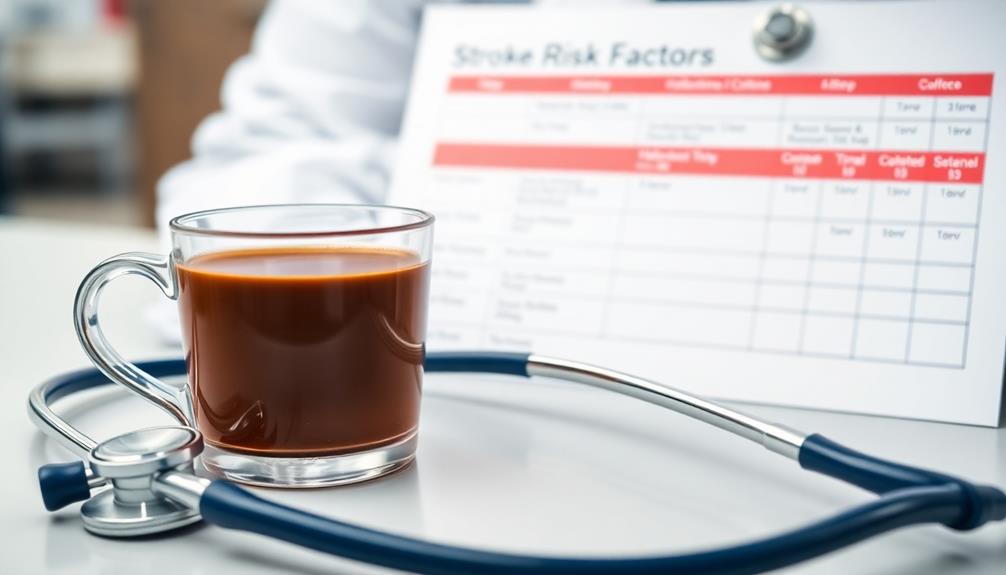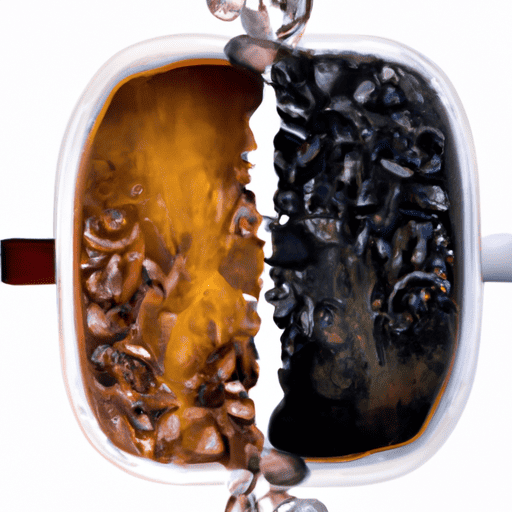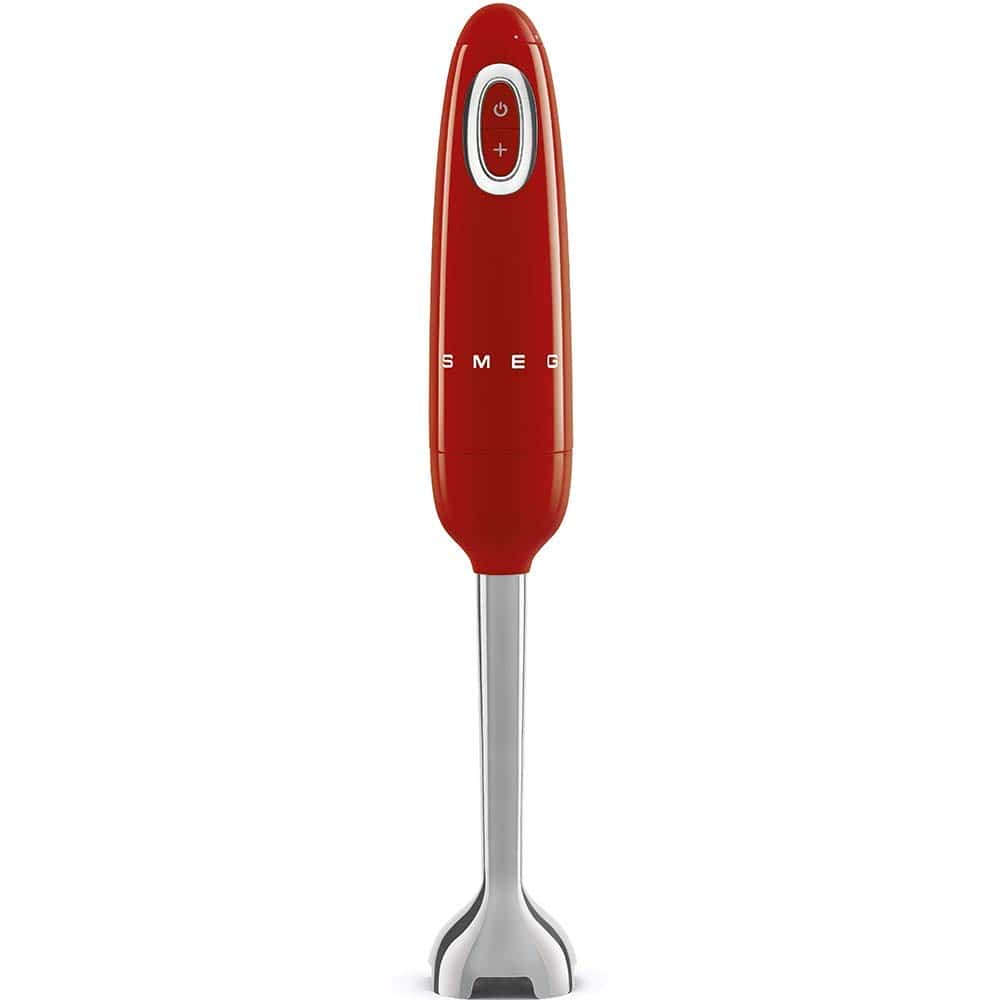Coffee, Tea and Alternatives and Health plus Fitness
Yerba Mate While Breastfeeding: Safe Use Guide

Welcome to our guide on safe consumption of yerba mate while breastfeeding. As a popular drink made from the leaves of the Ilex paraguariensis plant, yerba mate has gained recognition for its caffeine content and stimulating properties. However, when it comes to breastfeeding, caution is advised due to potential risks it may pose to both the mother and the baby.
Key Takeaways:
- Yerba mate contains caffeine and other chemicals that can stimulate the body.
- Long-term, excessive consumption of yerba mate, particularly when combined with alcohol or nicotine, may increase the risk of certain cancers.
- Pregnant and breastfeeding women should read product labels, be aware of caffeine content, and consult with a healthcare provider before consuming yerba mate.
- The safety of yerba mate consumption during breastfeeding is still uncertain, and it is generally recommended to err on the side of caution and avoid it.
- Discussing yerba mate consumption with a healthcare provider is crucial to ensure the well-being of both the mother and the baby.
What is Yerba Mate?
Yerba mate is a popular drink made from the leaves of the Ilex paraguariensis plant. It is similar to coffee or tea and contains caffeine and other chemicals that can stimulate the body. Yerba mate is consumed for various purposes, although there is limited scientific evidence to support its effectiveness. This herbal drink is known by other names such as mate.
Benefits of Yerba Mate
Despite the lack of extensive scientific research, yerba mate enthusiasts claim several potential benefits associated with its consumption. These include:
- Increased energy and mental alertness
- Enhanced focus and concentration
- Aid in digestion
- Boosted immune system
- Reduced fatigue
While these benefits are commonly attributed to yerba mate, it is important to note that individual experiences may vary and more thorough research is needed to validate these claims. As with any herbal drink or supplement, it is advisable to consume yerba mate in moderation and consult with a healthcare provider if you have any underlying health concerns or are taking medications.
How to Prepare Yerba Mate
- Fill a gourd or cup with yerba mate leaves, typically about two-thirds full.
- Insert a bombilla (a metal straw with a filter) into the gourd, allowing it to reach the bottom.
- Pour hot (but not boiling) water into the gourd, filling it to the top.
- Allow the yerba mate to steep for a few minutes.
- Sip through the bombilla, filtering out the leaves as you drink.
Tasting Notes
Yerba mate offers a unique and earthy flavor profile. It has a somewhat bitter taste, similar to green tea or black coffee, with hints of grassiness. Some people choose to sweeten their yerba mate with honey or add flavors such as lemon or mint to enhance the overall taste.
Caffeine Content
Yerba mate naturally contains caffeine, although the exact amount can vary depending on factors such as the brewing method and the specific brand or blend. On average, an 8-ounce cup of yerba mate contains approximately 30-50 milligrams of caffeine, which is less than a cup of coffee but more than a cup of tea.
For those seeking a caffeine boost without the jitters often associated with coffee or energy drinks, yerba mate can be a viable alternative. The combination of caffeine and other compounds present in yerba mate may provide an energizing effect without the same level of intensity as pure caffeine.
How Effective is Yerba Mate?
Yerba mate is often used for various purposes including athletic performance, memory enhancement, and combating fatigue. However, it’s important to note that there is limited scientific evidence to support its effectiveness in these areas. While some studies suggest potential benefits, more research is needed to determine the true extent of yerba mate’s effects on athletic performance, memory, and fatigue.
Although anecdotal evidence and traditional use suggest positive outcomes, scientific research is crucial to validate these claims and understand any potential mechanisms and limitations.
While yerba mate has been consumed for centuries and is believed to offer a range of health benefits, we currently lack comprehensive scientific evidence to confidently support its effectiveness. Further research is required to evaluate and elucidate the true potential of yerba mate.
Researchers continue to investigate the potential therapeutic properties of yerba mate, conducting studies and clinical trials to gather more data on its effects. There are ongoing efforts to examine yerba mate’s impact on athletic performance, memory, fatigue, and other areas of interest.
Scientific Studies and Research Findings
- A study published in the Journal of Ethnopharmacology analyzed the effects of yerba mate on athletes and found that it may enhance physical performance and reduce fatigue during exercise.
- Another controlled trial published in the Nutrients Journal investigated the acute effects of yerba mate on cognitive performance and reported improvements in attention, working memory, and alertness.
- However, it is important to note that these studies have limitations such as small sample sizes and short duration, indicating the need for larger, longer-term studies to validate these preliminary findings.
While the available scientific evidence is not yet sufficient to definitively establish the effectiveness of yerba mate, its long history of traditional use and anecdotal reports suggest potential benefits. Nevertheless, it is crucial to await further research and scientific consensus before drawing definitive conclusions regarding its effectiveness in specific areas.

Is Yerba Mate Safe to Consume?
When it comes to consuming yerba mate, safety is an important consideration. While yerba mate is considered possibly safe when used for up to 12 weeks, it is important to be aware of its potential side effects and risks associated with long-term use.
Yerba mate contains caffeine, which can have various effects on the body. While moderate amounts of caffeine are generally well-tolerated by most individuals, excessive consumption can lead to side effects such as:
- Insomnia: Difficulty falling asleep or staying asleep
- Upset stomach: Nausea, vomiting, or abdominal discomfort
- Increased heart rate: A rapid heartbeat or palpitations
While these side effects are usually mild and temporary, it is important to monitor your caffeine intake and listen to your body’s response.
Long-term and excessive consumption of yerba mate, especially when combined with alcohol or nicotine, has been associated with an increased risk of various types of cancer. This is because yerba mate contains certain compounds that can promote the growth of cancer cells in the body. If you are a regular consumer of yerba mate, it is advisable to limit your intake and be mindful of your consumption habits.
Pregnant and breastfeeding women should exercise caution when consuming yerba mate. While there is limited research on the effects of yerba mate during pregnancy and breastfeeding, it is suggested to avoid or limit its consumption. The caffeine in yerba mate can cross the placenta and enter breast milk, potentially affecting the developing baby. To prioritize the safety and well-being of both the mother and the baby, it is best to consult with a healthcare provider before consuming yerba mate during these periods.
Overall, while yerba mate can be enjoyed in moderation, it is important to be mindful of its caffeine content, potential side effects, and long-term risks associated with excessive consumption. Here at Our Yerba Mate Guide, we advocate for safe and informed consumption practices to ensure the well-being of our readers.

Interactions with Medications and Herbs
When consuming yerba mate, it is crucial to be aware of potential interactions with medications and herbs. Yerba mate contains active compounds that can affect how certain drugs are metabolized in the body. To ensure your safety and the effectiveness of your medications, it is essential to consult with a healthcare provider before consuming yerba mate if you are currently taking any medications or herbal supplements.
Some medications may interact with yerba mate, leading to altered drug levels in the bloodstream or increased side effects. Examples of medications that may interact with yerba mate include:
| Medication | Potential Interaction |
|---|---|
| Antidepressants (e.g., selective serotonin reuptake inhibitors) | Yerba mate may enhance the effects of antidepressants, increasing the risk of serotonin syndrome. |
| Antiplatelet drugs (e.g., aspirin, clopidogrel) | Yerba mate may inhibit platelet aggregation and increase the risk of bleeding when taken with antiplatelet drugs. |
| Anticoagulant drugs (e.g., warfarin) | Yerba mate may interfere with blood clotting and increase the risk of bleeding when taken with anticoagulant drugs. |
| Stimulant medications (e.g., amphetamines) | Yerba mate contains caffeine and other stimulating compounds, which may interact with stimulant medications, leading to increased nervousness, irritability, and cardiovascular effects. |
In addition to medications, certain herbs and supplements may also interact with yerba mate. Due to the potential for herb-drug interactions, it is important to inform your healthcare provider about all the herbal supplements you are taking before consuming yerba mate. Examples of herbs that may interact with yerba mate include:
- Echinacea
- St. John’s wort
- Ginkgo biloba
- Ginseng
By discussing your medication and supplement regimen with your healthcare provider, you can ensure the safe and effective use of yerba mate. Your healthcare provider will consider potential interactions and provide personalized recommendations based on your unique circumstances.

Safe Consumption During Pregnancy
Pregnancy is a critical time for the health and well-being of both the mother and the developing fetus. When it comes to consuming yerba mate, caution is advised due to potential risks it may pose to pregnancy.
Yerba mate is considered possibly unsafe during pregnancy, primarily due to its caffeine content. While caffeine is found in various beverages and foods, including coffee, tea, and chocolate, it is important to limit its consumption during pregnancy to reduce the potential harm to the fetus.
Caffeine crosses the placenta and can affect the developing fetus. It has been associated with an increased risk of miscarriage, preterm birth, low birth weight, and developmental delays. Therefore, pregnant women are advised to limit their daily caffeine intake to no more than 300 mg, which is approximately equivalent to six cups of yerba mate.
In addition to caffeine, yerba mate also contains certain chemicals that have been linked to an increased risk of cancer. Although further research is needed to fully understand the extent of this risk, it is advisable for pregnant women to exercise caution and avoid excessive consumption of yerba mate.
It is important to note that each pregnancy is unique, and individual circumstances can vary. Therefore, it is always recommended to consult with a healthcare provider before making any dietary changes or consuming any substances during pregnancy.
Safety during pregnancy is paramount, and making informed choices plays a crucial role in ensuring a healthy outcome for both the mother and the baby.

| Risks of Yerba Mate Consumption During Pregnancy | Recommended Guidelines |
|---|---|
| Risk of cancer due to certain chemicals in yerba mate | Avoid excessive consumption |
| Potential adverse effects of caffeine on fetal development | Limit caffeine intake to no more than 300 mg per day |
| Risks of miscarriage, preterm birth, low birth weight, and developmental delays | Exercise caution and consult with a healthcare provider |
By following these guidelines and seeking medical advice, pregnant women can make informed decisions regarding the consumption of yerba mate and prioritize the health and safety of themselves and their baby.
Safe Consumption While Breastfeeding
When it comes to yerba mate, the safety of breastfeeding mothers is a crucial consideration. Unfortunately, consuming yerba mate while breastfeeding is considered possibly unsafe. This is because the cancer-causing chemicals found in yerba mate can pass into breast milk, potentially posing risks to the nursing infant.
Another factor to consider is the caffeine content of yerba mate. While caffeine is naturally present in yerba mate, it can have effects on infants. Consuming yerba mate while breastfeeding may lead to irritability and increased bowel movements in nursing infants, which can be distressing for both the baby and the mother.
Considering these potential risks, it is recommended for breastfeeding mothers to avoid consuming yerba mate altogether. By doing so, you can ensure the safety and well-being of both you and your baby.

Quoting an Expert:
“Breastfeeding is a critical period for both the mother and the baby, and it’s important to be mindful of what you consume. Yerba mate contains substances that may be harmful to the infant, so it’s best to avoid it while breastfeeding.” – Dr. Ava Thompson, Board Certified Pediatrician
Tips for Safe Consumption:
- Avoid yerba mate products while breastfeeding
- Be aware of caffeine content in other beverages and limit intake
- Consult with a healthcare provider for guidance on safe alternatives
In summary, it is best for breastfeeding mothers to err on the side of caution and avoid consuming yerba mate. By prioritizing the safety and well-being of both you and your baby, you can make informed choices that support a healthy breastfeeding journey.
| Potential Risks of Consuming Yerba Mate While Breastfeeding | |
|---|---|
| Cancer-causing chemicals in yerba mate can pass into breast milk | Increase in bowel movements and irritability in nursing infants due to caffeine content |
Special Precautions and Warnings
When it comes to consuming yerba mate, there are several special precautions and warnings that you should be aware of. If you have any of the following conditions, it is advisable to avoid consuming yerba mate:
- Alcohol use disorder
- Anxiety disorders
- Bleeding disorders
- Heart conditions
- Diabetes
- Seizures
- Glaucoma
- High blood pressure
- Irritable bowel syndrome
- Weak bones (osteoporosis)
Yerba mate may interact with medications used to treat these conditions and worsen certain symptoms. Therefore, it is crucial to consult with a healthcare provider before consuming yerba mate if you have any of these conditions.
It is always better to err on the side of caution and prioritize your health and well-being. By being mindful of these special precautions and warnings, you can ensure a safe and enjoyable experience with yerba mate.
Interactions with Other Substances
When consuming yerba mate, it’s important to consider its potential interactions with other substances, particularly alcohol and smoking. These interactions can have a significant impact on your health. Let’s explore the effects of yerba mate when combined with these substances.
1. Yerba Mate and Alcohol
Drinking yerba mate with large amounts of alcohol long-term may increase the risk of cancer.
Yerba mate and alcohol both contain chemicals that can have detrimental effects on your body when consumed excessively. When combined, these two substances may amplify the harmful effects and pose a greater risk to your health.
“The combination of yerba mate and alcohol consumption can have synergistic effects on the development of cancer.”
Studies have shown that individuals who consume both yerba mate and alcohol in large quantities over a long period have an increased risk of developing certain types of cancer, including oral, esophageal, and laryngeal cancer.
2. Yerba Mate and Smoking
Smoking combined with yerba mate consumption also seems to increase the risk of getting cancer.
Smoking is a well-known risk factor for various types of cancer and other health conditions. When combined with the consumption of yerba mate, smoking can exacerbate the negative effects on your body.
“The combination of smoking and yerba mate consumption may further increase the risk of cancer development.”
Research suggests that individuals who smoke and consume yerba mate are at a higher risk of developing cancers such as lung, oral, and esophageal cancer compared to those who don’t smoke or consume yerba mate.
It’s important to be aware of these interactions and their potential health risks. By understanding the effects of combining yerba mate with alcohol and smoking, you can make informed decisions about your consumption habits.
Summary of Interactions and Side Effects
Yerba mate, a popular drink made from the leaves of the Ilex paraguariensis plant, may have interactions with certain medications, herbs, and substances. It is important to exercise caution and consult with a healthcare provider before consuming yerba mate, especially if you have any underlying medical conditions or are taking other medications or supplements.
Interactions with Medications
Yerba mate may interact with certain medications. It is recommended to consult with a healthcare provider before consuming yerba mate if you are taking any prescription or over-the-counter medications to avoid any potential adverse effects or interactions.
Interactions with Herbs
In addition to medications, yerba mate may also interact with certain herbs. It is important to inform your healthcare provider about any herbal supplements you are taking to ensure there are no contraindications or negative interactions.
Interactions with Substances
Yerba mate can also have interactions with substances such as alcohol and smoking. Consuming yerba mate in large amounts or combining it with alcohol may increase the risk of certain health conditions, including cancer. Similarly, smoking in combination with yerba mate consumption has been associated with an increased risk of cancer.
Side Effects
While yerba mate is generally considered safe when consumed in moderation, it does contain caffeine, which can cause side effects such as insomnia, upset stomach, and increased heart rate. Long-term and excessive consumption of yerba mate, especially when combined with alcohol or nicotine, has been linked to an increased risk of various types of cancer.
“Yerba mate may have interactions with certain medications, herbs, and substances.”
Caution and Consultation
Given the potential interactions and side effects of yerba mate, it is important to exercise caution and consult with a healthcare provider before consuming it. This is particularly crucial if you have any underlying medical conditions or take medications or supplements regularly. Your healthcare provider can provide personalized advice and guidance based on your specific circumstances.
By taking the necessary precautions and seeking professional advice, you can make informed decisions about consuming yerba mate and ensure your health and well-being are prioritized.
Conclusion
After evaluating the available scientific evidence, we conclude that while yerba mate is a popular beverage with potential stimulant effects, its effectiveness for various purposes remains inconclusive. Yerba mate contains caffeine and other stimulating chemicals that can have both positive and negative effects on the body.
However, it is important to note that excessive and long-term consumption of yerba mate, particularly when combined with alcohol or nicotine, has been associated with an increased risk of certain cancers. Therefore, it is crucial to exercise caution and consume yerba mate in moderation.
For pregnant and breastfeeding women, the consumption of yerba mate should be approached with additional care. The caffeine and cancer-causing chemicals in yerba mate may pose risks to both the mother and the baby. To ensure safe consumption, it is advisable to read product labels, be aware of the caffeine content, and consult with a healthcare provider before incorporating yerba mate into your diet while breastfeeding.
In conclusion, while yerba mate can be enjoyed as a beverage, it is essential to recognize its potential risks and limitations. Prioritizing safe consumption practices and seeking professional advice can help individuals make informed decisions about incorporating yerba mate into their daily routine.
Yerba mate is a drink made from the leaves of the Ilex paraguariensis plant. It is similar to coffee or tea and contains caffeine and other chemicals that can stimulate the body. It is also known by other names such as mate.
While yerba mate is used for various purposes such as athletic performance, memory, and fatigue, there is limited scientific evidence to support its effectiveness. More research is needed to determine its true benefits for these purposes.
Yerba mate is considered possibly safe when used for up to 12 weeks. However, it contains caffeine, which can cause side effects such as insomnia, upset stomach, and increased heart rate. Long-term and excessive consumption of yerba mate, especially when combined with alcohol or nicotine, has been linked to an increased risk of various types of cancer. Yerba mate may interact with certain medications and herbs. It is important to consult with a healthcare provider before consuming yerba mate if you are taking any medications or herbal supplements.
Yerba mate is considered possibly unsafe when taken during pregnancy. It may increase the risk of getting cancer and contains caffeine, which should be limited to avoid potential harm to the fetus. Pregnant women are advised to avoid consuming more than 300 mg of caffeine daily, which is approximately 6 cups of yerba mate.
Yerba mate is considered possibly unsafe when taken while breastfeeding. The cancer-causing chemicals in yerba mate may pass into breast milk and the caffeine content may cause irritability and increased bowel movements in nursing infants. It is recommended to avoid consuming yerba mate while breastfeeding.
Yes, there are several special precautions and warnings associated with the consumption of yerba mate. These include avoiding it if you have certain conditions such as alcohol use disorder, anxiety disorders, bleeding disorders, heart conditions, diabetes, seizures, glaucoma, high blood pressure, irritable bowel syndrome, or weak bones (osteoporosis). Yerba mate may interact with medications used to treat these conditions and worsen certain symptoms.
Yerba mate may interact with alcohol and smoking. Consuming yerba mate with large amounts of alcohol long-term may increase the risk of cancer. Smoking combined with yerba mate consumption also seems to increase the risk of getting cancer. Yerba mate may interact with certain medications, herbs, and substances such as alcohol and smoking. It is important to exercise caution and consult with a healthcare provider before consuming yerba mate, especially if you have any underlying medical conditions or are taking other medications or supplements.
Yerba mate is a popular drink similar to coffee or tea, but there is limited scientific evidence to support its effectiveness for various purposes. It contains caffeine and other chemicals that can stimulate the body, but it also poses risks when consumed excessively or in combination with alcohol or nicotine. Pregnant and breastfeeding women should exercise caution when consuming yerba mate, as it may have adverse effects on both the mother and the baby. It is important to read product labels, be aware of caffeine content, and consult with a healthcare provider before consuming yerba mate while breastfeeding.
FAQ
What is yerba mate?
How effective is yerba mate?
Is yerba mate safe to consume?
Are there any interactions with medications and herbs?
Is yerba mate safe to consume during pregnancy?
Is it safe to consume yerba mate while breastfeeding?
Are there any special precautions and warnings associated with yerba mate consumption?
Does yerba mate interact with other substances?
What is the summary of interactions and side effects?
Is it safe to consume yerba mate?
Source Links
- https://nursing.ceconnection.com/ovidfiles/00005721-201605000-00009.pdf
- https://www.webmd.com/vitamins/ai/ingredientmono-828/yerba-mate
- https://medlineplus.gov/druginfo/natural/828.html
In the vast and diverse world of coffee, coffee alternatives, and tea, Olivia has found her calling. As an author and a dedicated coffee and tea aficionado, her work for Cappuccino Oracle reflects her profound love and understanding of the intricate complexities found within these beverages. Olivia’s passion for the subject serves as both a catalyst for her creativity and a connection point with her audience.
Olivia’s appreciation for coffee, coffee alternatives, and tea blossomed at an early age. She discovered that these beverages invigorated her senses and stimulated her creative spirit. From the nuanced flavors of single-origin roasts to the captivating narratives intertwined with coffee, coffee alternatives, and tea trade and culture, Olivia found an unlimited source of inspiration in her daily cup.
Her love for these beverages and her talent for storytelling eventually converged at Cappuccino Oracle. As an author, Olivia’s mission is to illuminate the intricate tapestry that makes up the world of coffee, coffee alternatives, and tea. Her articles span a diverse range of topics, encompassing everything from the unique flavors of different brews to the sociocultural history intertwined with their cultivation and consumption.
Coffee, Tea and Alternatives and Health plus Fitness
Decaf Coffee and Cardiovascular Health
Just when you thought decaf coffee was heart-friendly, new research reveals alarming risks that could change your mind. Discover the truth behind decaf and cardiovascular health.

Decaf coffee might seem like a safe alternative, but it can actually increase your heart failure risk. Research indicates that regular decaf consumption is linked to a rise in harmful LDL cholesterol and NEFA levels. While moderate caffeinated coffee intake benefits cardiovascular health, decaf lacks these protective effects. If you have existing heart issues, it could pose even greater risks. So, if you're considering decaf for heart health, you may want to think again. To uncover more about the complex relationship between coffee and cardiovascular wellness, you can explore further insights on this topic.
Key Takeaways
- Decaf coffee consumption is linked to an increased heart failure risk, with some studies indicating significant cardiovascular concerns.
- The Framingham Heart Study reported an 8% rise in harmful LDL cholesterol associated with regular decaf coffee intake.
- Unlike caffeinated coffee, decaf lacks protective heart health benefits, especially for individuals with existing cardiovascular disease.
- Mixed results from the Cardiovascular Health Study leave uncertainty regarding decaf coffee's overall safety for heart health.
- Further research is necessary to understand the specific compounds in decaf that may negatively affect cardiovascular health.
Overview of Coffee and Heart Health

When it comes to coffee and heart health, the evidence clearly favors moderate consumption of caffeinated varieties.
Research consistently shows that drinking 2-3 cups of caffeinated coffee daily can notably lower your risk of cardiovascular disease and mortality. In fact, for every cup you consume, you might enjoy a 5-12% reduction in heart failure risk, with some studies indicating a 30% lower risk for those who drink two or more cups each day.
On the other hand, decaffeinated coffee doesn't deliver the same heart health benefits. Certain studies have linked decaf consumption to an increased risk of heart failure, highlighting a clear disparity between caffeinated and decaffeinated options.
The Atherosclerosis Risk in Communities Study further emphasizes the importance of moderate consumption, finding no notable change in heart failure risk for those drinking 0 to 1 cup of caffeinated coffee daily.
Decaf Coffee's Potential Risks

While moderate consumption of caffeinated coffee shows clear cardiovascular benefits, the same can't be said for decaffeinated varieties. Research from the Framingham Heart Study indicates a significant increase in heart failure risk associated with decaffeinated coffee consumption, raising potential cardiovascular concerns.
Although participants in the Cardiovascular Health Study showed no change in heart failure risk when consuming decaf, these mixed findings leave uncertainty regarding its safety.
Moreover, decaffeinated coffee has been linked to an 8% rise in harmful LDL cholesterol levels and an 18% increase in NEFA levels, suggesting a connection with metabolic syndrome.
For coffee drinkers with existing cardiovascular disease, it's crucial to recognize that decaf didn't demonstrate the same protective benefits as caffeinated options. This lack of protective effects raises risks for heart health that shouldn't be overlooked.
Ultimately, regular consumption of decaffeinated coffee may pose risks, particularly for those already facing cardiovascular challenges. Further research is necessary to fully understand the implications of decaf on heart health.
If you're considering decaf, it's wise to weigh these potential risks against the benefits seen with caffeinated coffee.
Caffeinated Coffee Benefits

Caffeinated coffee offers numerous benefits for heart health that shouldn't be overlooked. Drinking one or more cups of caffeinated coffee daily can markedly reduce your risk of heart failure, with studies showing a 5-12% decrease in risk per cup. If you're consuming two or more cups, that risk might drop by as much as 30%.
Moderate coffee intake, defined as 2-3 cups daily, is consistently linked to lower incidences of cardiovascular disease and even mortality. This contradicts the notion that coffee is harmful to heart health; in fact, caffeine consumption has been observed to help decrease heart failure risk.
Regular coffee drinkers with existing cardiovascular disease enjoy lower mortality odds compared to non-coffee drinkers, suggesting that caffeine may offer protective benefits.
Additionally, caffeinated coffee consumption might help lower inflammation markers, further supporting heart health.
Recommendations for Coffee Consumption

Moderate coffee consumption, typically defined as 3-5 cups of plain black coffee daily, can be an integral part of a heart-healthy diet. Drinking 2-3 cups of caffeinated coffee daily is linked to a lower risk of heart disease and improved cardiovascular health.
The Atherosclerosis Risk in Communities Study highlights that those consuming 2 or more cups of caffeinated coffee daily experience a 30% lower heart failure risk compared to those who drink 0 to 1 cup.
However, it's important to watch your coffee intake. Excessive caffeine, defined as over 5 cups per day, may negate these positive effects. While decaffeinated coffee is a great option for some, it may not provide the same benefits.
In fact, some studies indicate that decaf could even increase heart failure risk.
To maximize coffee benefits, stick to moderate coffee consumption and avoid high-calorie coffee drinks like lattes or macchiatos. These can undermine the heart-healthy advantages you gain from your daily coffee routine.
Future Research Directions

Future research on decaffeinated coffee is essential to understand its true impact on cardiovascular health. To establish a causal relationship between decaffeinated coffee consumption and cardiovascular outcomes, researchers need to explore the specific compounds within decaf that might affect LDL cholesterol levels and metabolic syndrome indicators. Understanding these health implications can provide valuable insights.
Additionally, it's important to investigate the bioinformatics differences that may explain the contrasting cardiovascular outcomes observed between caffeinated and decaffeinated coffee. This exploration will help clarify the biological effects each type has on the heart and vascular system.
Expanding studies to include diverse populations with varying dietary habits and genetic backgrounds will enhance our understanding of decaf coffee's broader health impacts.
Longitudinal studies monitoring the long-term effects of decaffeinated coffee, particularly among those with pre-existing cardiovascular conditions, are essential for developing informed dietary guidelines.
Frequently Asked Questions
Does Decaf Coffee Affect the Heart?
When you drink decaf coffee, you might wonder how it affects your heart.
Some studies suggest it could increase certain risk factors for heart disease, raising concerns.
While research is mixed—some show no significant impact, while others indicate a rise in harmful cholesterol—you should stay informed.
It's essential to take into account these findings and consult with a healthcare professional if you're concerned about your heart health and coffee consumption.
Is There Anything Unhealthy About Decaf Coffee?
When you consider whether decaf coffee is unhealthy, it's important to look at various factors.
Some studies suggest it might raise LDL cholesterol levels, which isn't ideal for heart health. Additionally, the decaffeination process can strip away beneficial compounds found in regular coffee.
However, not all research agrees, and more studies are needed to truly understand the effects.
Is Decaf Coffee Ok for High Blood Pressure?
Think of your heart as a finely tuned engine; you wouldn't want to add anything that could cause it to sputter.
If you've got high blood pressure, you might want to approach decaf coffee with caution. Some studies suggest it mightn't offer the same heart-protective benefits as its caffeinated counterpart.
It's best to consult your healthcare provider for personalized advice on whether decaf is a safe choice for you.
Does Decaf Coffee Affect Blood Flow?
When you drink decaf coffee, you might wonder how it affects your blood flow. Some studies suggest it doesn't enhance blood flow as much as regular coffee.
In fact, decaf could potentially lead to increased LDL cholesterol levels, which may impact circulation negatively.
While you may enjoy the taste, it's crucial to reflect on these findings. Balancing your coffee choices and staying informed can help you make better decisions for your overall health.
Conclusion
To sum up, while some might worry that decaf coffee lacks the heart-healthy benefits of its caffeinated counterpart, it still offers a range of positive effects on cardiovascular health. By enjoying decaf in moderation, you can savor its rich flavors without the jitters. So, whether you prefer a morning cup or an evening treat, embracing decaf can be a smart choice for your heart while still indulging your coffee cravings. Keep exploring the benefits—your heart will thank you!
In the vast and diverse world of coffee, coffee alternatives, and tea, Olivia has found her calling. As an author and a dedicated coffee and tea aficionado, her work for Cappuccino Oracle reflects her profound love and understanding of the intricate complexities found within these beverages. Olivia’s passion for the subject serves as both a catalyst for her creativity and a connection point with her audience.
Olivia’s appreciation for coffee, coffee alternatives, and tea blossomed at an early age. She discovered that these beverages invigorated her senses and stimulated her creative spirit. From the nuanced flavors of single-origin roasts to the captivating narratives intertwined with coffee, coffee alternatives, and tea trade and culture, Olivia found an unlimited source of inspiration in her daily cup.
Her love for these beverages and her talent for storytelling eventually converged at Cappuccino Oracle. As an author, Olivia’s mission is to illuminate the intricate tapestry that makes up the world of coffee, coffee alternatives, and tea. Her articles span a diverse range of topics, encompassing everything from the unique flavors of different brews to the sociocultural history intertwined with their cultivation and consumption.
Coffee, Tea and Alternatives and Health plus Fitness
Coffee Consumption After Heart Surgery
You may wonder how coffee affects your recovery after heart surgery—discover essential insights that could influence your health choices.

After heart surgery, you should be cautious about coffee consumption. Caffeine can raise your heart rate, so limiting it during the initial weeks is often recommended. Start with small amounts if your healthcare provider approves, and pay attention to how your body reacts. If you notice increased heart palpitations, anxiety, or insomnia, it might be best to avoid coffee altogether. Alternatives like herbal teas or decaffeinated coffee can be good options as you recover. Staying informed about your symptoms and following professional advice can help guarantee a smooth shift to your regular diet. There's more to evaluate as you navigate this.
Key Takeaways
- Limit caffeine intake for the initial weeks post-surgery to avoid increased heart rate and stress on the central nervous system.
- Consult your healthcare provider before reintroducing coffee to assess individual recovery needs and sensitivities.
- Start with small amounts of coffee, monitoring for any adverse effects like anxiety or insomnia.
- Consider caffeine-free alternatives, such as herbal teas, decaffeinated coffee, or fresh fruit smoothies, to stay hydrated and nourished.
- Keep a journal to track caffeine consumption and symptoms, which can aid discussions with your healthcare provider.
Effects of Caffeine on Recovery

When recovering from heart surgery, the effects of caffeine on your body can be significant. Caffeine can negatively impact your central nervous system and heart rate, making it generally inadvisable during the early stages of recovery. Most healthcare professionals recommend temporarily restricting caffeine intake until your cardiologist gives the green light to reintroduce it. This precaution helps guarantee your healing process remains smooth and complications are minimized.
If you've been a regular caffeine consumer, you might experience withdrawal symptoms like headaches and fatigue when you suddenly cut it out. These symptoms can complicate your recovery, so it's important to approach this shift thoughtfully.
Additionally, caffeine's diuretic properties can lead to increased fluid loss, which is a vital consideration as your body heals.
While some studies have explored caffeine's link to coronary heart disease, results are conflicting, underscoring the need for personalized dietary recommendations post-surgery.
Ultimately, taking a cautious and informed approach to caffeine consumption will support your healing process and help you focus on regaining your strength after heart surgery. Listen to your healthcare team's advice and prioritize your recovery during this important time.
Recommendations for Coffee Intake

After heart surgery, it's crucial to approach coffee intake with caution. While coffee is a beloved staple in many people's lives, its effects on heart rate and the central nervous system can be concerning during your recovery.
Here are some recommendations to reflect on:
- Limit caffeine initially: Avoid coffee for the first few weeks post-surgery to reduce the risk of increased heart rate and insomnia.
- Follow healthcare advice: Always adhere to your doctor's specific recommendations regarding coffee intake. They know your individual recovery needs best.
- Monitor your body's response: If your cardiologist approves coffee reintroduction, start with small amounts and pay attention to how your body reacts.
Alternatives to Coffee

Exploring alternatives to coffee can enhance your recovery after heart surgery while still providing satisfying flavors and comforting warmth. Here are some excellent options to evaluate:
| Beverage Type | Benefits | Flavor Profile |
|---|---|---|
| Herbal Teas | Caffeine-free, soothing effects | Chamomile is floral; peppermint is revitalizing |
| Decaffeinated Coffee | Similar taste with less caffeine | Rich and familiar, yet gentle |
| Roasted Grain Beverages | Caffeine-free, nutty flavor | Barley is earthy; chicory is robust |
| Fresh Fruit Smoothies | Hydrating and nutrient-rich | Sweet and fruity, customizable |
| Warm Water with Lemon/Ginger | Aids digestion, invigorating | Zesty and energizing |
Monitoring Your Body's Response
Monitoring your body's response to caffeine is essential following heart surgery. After your procedure, caffeine can impact your heart rate and central nervous system activity, so it's important to stay aware of how it affects you.
- Keep an eye out for increased heart palpitations.
- Notice any signs of anxiety or insomnia.
- Track your hydration levels since caffeine can act as a diuretic.
You might find that your sensitivity to caffeine has changed post-surgery. It's critical to pay attention to any symptoms you experience, as these could indicate how well your body is adjusting during recovery.
Keeping a journal of your caffeine intake alongside any physical symptoms can help you spot patterns that are worth discussing with your healthcare provider.
Before reintroducing coffee into your routine, consult your cardiologist. They'll provide guidance on when it's appropriate based on your individual recovery progress.
Consulting Healthcare Professionals

Consulting healthcare professionals is essential for safely reintroducing coffee into your diet after heart surgery. Before diving back into your caffeine routine, reach out to your cardiologist. Caffeine can notably affect your heart rate and overall cardiovascular health, so their guidance is significant. They may recommend a temporary restriction on caffeine intake as you monitor your recovery, helping to prevent potential complications.
Be open about any pre-existing conditions or sensitivities to caffeine when you talk to your doctor. This transparency allows them to provide personalized advice tailored to your situation.
Your healthcare team will often suggest reassessing your ability to consume coffee after a specific recovery period, ensuring you're on the right track. Regular follow-ups with your healthcare provider are essential.
These appointments let them track your recovery progress and adjust your dietary recommendations, including caffeine intake, as needed. By maintaining this communication, you can make informed decisions about when it might be safe to enjoy your favorite cup of coffee again.
Ultimately, prioritizing your health and following professional advice will help you achieve a smooth shift back to your normal diet.
Frequently Asked Questions
How Long After Heart Surgery Can You Drink Coffee?
How long after heart surgery can you drink coffee?
Typically, you'll want to wait a few weeks until your body stabilizes. Most doctors suggest avoiding caffeine for about 4 to 6 weeks post-surgery.
It's important to consult your healthcare provider for personalized advice based on your recovery.
Once you get the green light, reintroduce coffee gradually, paying close attention to how your body reacts, especially concerning your heart rate and overall well-being.
Is It Okay for Heart Patients to Drink Coffee?
You might wonder if it's okay for heart patients to drink coffee.
While moderate coffee consumption is generally safe for many, you should consult your healthcare provider first. They'll assess your individual health needs and might recommend limiting caffeine intake, especially after surgery.
If given the green light, enjoy your coffee in moderation, keeping an eye on overall caffeine from other sources like tea and soft drinks to stay within safe limits.
Can I Drink Coffee After a Stent?
You might wonder if you can drink coffee after getting a stent.
It's important to consult your cardiologist first, as recommendations vary based on your health.
Generally, it's wise to avoid caffeine temporarily, as it can overstimulate your heart and lead to irregular beats.
Once you've recovered and your doctor gives the green light, you can slowly reintroduce coffee, keeping an eye on how it affects you personally.
Always prioritize your heart health!
How Soon After Surgery Can I Have Coffee?
How soon after surgery you can have coffee depends on your specific recovery and your doctor's advice.
Generally, it's best to wait a few weeks before reintroducing it. Your healthcare provider will assess your progress during follow-up visits and let you know when it's safe to start drinking coffee again.
Pay attention to how your body reacts to caffeine, as some may find they're more sensitive after surgery.
Always prioritize your health!
Conclusion
To sum up, while coffee can have its perks, you'll want to be cautious after heart surgery. Studies show that about 30% of patients report improved mood and energy levels with moderate coffee consumption. However, everyone's recovery is unique, so listen to your body and consult your healthcare team. If you find coffee doesn't sit well with you, there are plenty of tasty alternatives to keep you energized without compromising your health.
In the vast and diverse world of coffee, coffee alternatives, and tea, Olivia has found her calling. As an author and a dedicated coffee and tea aficionado, her work for Cappuccino Oracle reflects her profound love and understanding of the intricate complexities found within these beverages. Olivia’s passion for the subject serves as both a catalyst for her creativity and a connection point with her audience.
Olivia’s appreciation for coffee, coffee alternatives, and tea blossomed at an early age. She discovered that these beverages invigorated her senses and stimulated her creative spirit. From the nuanced flavors of single-origin roasts to the captivating narratives intertwined with coffee, coffee alternatives, and tea trade and culture, Olivia found an unlimited source of inspiration in her daily cup.
Her love for these beverages and her talent for storytelling eventually converged at Cappuccino Oracle. As an author, Olivia’s mission is to illuminate the intricate tapestry that makes up the world of coffee, coffee alternatives, and tea. Her articles span a diverse range of topics, encompassing everything from the unique flavors of different brews to the sociocultural history intertwined with their cultivation and consumption.
Coffee, Tea and Alternatives and Health plus Fitness
Understanding Coffee and Stroke Risk
Optimizing your coffee intake could significantly lower stroke risk, but what happens when you exceed the recommended amount? Discover the surprising details.

Understanding coffee's relationship with stroke risk is essential for your health. Consuming 3-4 cups of coffee daily can lead to a 21% reduction in stroke risk, thanks to its high antioxidant content. This moderate intake offers protective benefits without raising LDL cholesterol levels, especially when you choose filtered coffee. However, drinking more than four cups won't enhance protection and can potentially lead to negative effects like increased blood pressure. By being mindful of your coffee consumption, you can better support your cardiovascular health. There's more to discover about the nuances of coffee and its health impacts.
Key Takeaways
- Moderate coffee consumption (3-4 cups daily) is associated with a 21% reduction in stroke risk, backed by extensive research.
- Filtered coffee is healthier than unfiltered, as it does not raise LDL cholesterol and retains more antioxidants.
- High blood pressure and heart disease significantly increase stroke risk, making lifestyle choices crucial for prevention.
- Green tea, consumed in moderation, offers additional stroke protection and complements the benefits of coffee.
- Excessive coffee intake (over 6 cups) can negate health benefits and increase cholesterol and blood pressure risks.
Coffee Consumption Overview

When it comes to coffee consumption, research shows that enjoying 3-4 cups a day can considerably lower your stroke risk by 21%. A 2021 meta-analysis involving 2.4 million participants revealed that even those who drink less than 3 cups daily still experience a reduced risk compared to non-coffee drinkers.
Additionally, incorporating a variety of nutrient-rich foods like baked kale can further enhance your overall health and well-being. So, if you're looking to maintain your health, moderate amounts of coffee can be a beneficial addition to your routine.
It's important to note that higher consumption—more than 4 cups per day—doesn't provide any extra protective effects against stroke. Sticking to moderate amounts of black filtered coffee is key to maximizing health benefits. Avoiding additives like cream and sugar can help you reap the full rewards of your coffee habit.
Beyond stroke risk, coffee consumption is also linked to lower risks of diabetes, obesity, and atherosclerosis, all of which contribute to stroke risk.
Stroke Risk Factors

While enjoying coffee can lower your stroke risk, it's important to recognize the various factors that contribute to stroke likelihood. Strokes mainly affect individuals aged 55-85, with ischemic strokes making up about 80% of cases. Among the most notable stroke risk factors is high blood pressure, which can increase your risk by 2-4 times before age 80.
To help you understand the key contributors to stroke risk, here's a quick reference table:
| Risk Factor | Impact on Stroke Risk |
|---|---|
| High Blood Pressure | Major contributor; greatly increases risk |
| Heart Disease | Increases likelihood of ischemic stroke |
| Diabetes | Modifiable risk factor; can be managed |
| Lifestyle Choices | Smoking and inactivity worsen risk |
Benefits of Moderate Coffee Intake

How does moderate coffee intake impact your stroke risk? Research shows that drinking 3-4 cups of coffee per day can lead to a 21% reduction in stroke risk, according to a 2021 meta-analysis involving 2.4 million participants.
Even if you consume less than 3 cups daily, you're still better off than non-drinkers, highlighting the health benefits of moderate coffee consumption.
Moderate intake of coffee is linked to lower risks of diabetes, obesity, and atherosclerosis, all of which contribute to better cardiovascular health.
When you enjoy your coffee as black filtered coffee, you maximize these protective effects, since additives like cream and sugar can diminish its health benefits.
Additionally, combining coffee with green tea—up to 4-6 cups total—may offer even more protection against ischemic stroke due to the antioxidant properties found in both beverages.
So, if you're looking to boost your cardiovascular health and reduce your stroke risk, enjoying moderate coffee intake can be a delicious and effective strategy.
Just remember to keep it simple and black for the best results!
Potential Risks of Coffee

Recognizing the potential risks of coffee is essential for maintaining your health, especially if you consume it in large quantities. High coffee consumption, particularly over six daily cups, has been linked to increased cholesterol levels, which may elevate your stroke risk and the likelihood of cardiovascular disease.
Additionally, while coffee has its health benefits, excessive intake can counteract these positives. If you struggle with severe hypertension, drinking more than two cups a day can double your risk of cardiovascular issues and even increase mortality risk.
Long-term coffee consumption can lead to heightened blood pressure in some individuals, so moderation is key. You might also experience negative health effects from excessive intake, such as anxiety, heart palpitations, and sleep disturbances. These effects can greatly impact your overall well-being, making it essential to keep an eye on your daily cups.
If you have severe hypertension, it's especially important to consult your healthcare provider regarding your coffee intake. They can help you manage potential risks effectively, ensuring that you enjoy your coffee while safeguarding your health.
Brewing Methods and Health

When it comes to brewing coffee, the method you choose can greatly impact your health.
Filtered coffee is generally better for you, while unfiltered versions might raise your LDL cholesterol levels.
If you're looking for alternatives, consider green tea or adding antioxidant-rich foods to your diet to boost heart health.
Filtered vs. Unfiltered Coffee
The brewing method you choose for your coffee can greatly impact your health, particularly concerning stroke and cardiovascular risks.
Filtered coffee is associated with lower mortality rates and a reduced risk of cardiovascular disease compared to unfiltered coffee. Unfiltered coffee, like that made with a French press, contains higher levels of diterpenes, compounds that can raise LDL cholesterol levels. This elevation in cholesterol might increase your stroke risk and overall heart disease risk.
Research has shown that drinking 3-4 cups of black filtered coffee daily can considerably lower your chances of experiencing a stroke or developing cardiovascular issues. In contrast, relying on unfiltered coffee could negate those health benefits.
If you're looking for alternatives, green tea also shows promise; studies indicate that consuming 2-4 cups a day can further reduce stroke risk.
When choosing your brewing method, consider how it impacts cholesterol levels and overall health. Opting for filtered coffee could be a simple yet effective way to improve your cardiovascular health and lower your stroke risk.
Additives Impact on Benefits
Additives in coffee can greatly undermine its health benefits, particularly when it comes to stroke risk. If you're aiming to maximize the positive effects of coffee, it's crucial to reconsider what you're adding to your cup.
Brewing methods, such as using a French press or drip coffee maker, can also play a role in your coffee's health properties, as various brewing methods affect caffeine content considerably.
Here's what you should know:
- Sugar and cream can negate the protective effects of coffee.
- Filtered coffee is linked to lower mortality rates.
- Unfiltered coffee might raise LDL cholesterol levels, increasing cardiovascular risks.
To truly benefit from coffee, stick to plain black coffee.
Studies show that filtered coffee not only reduces stroke risk but also enhances heart health. When you load your coffee with additives, you risk experiencing adverse health effects that can counteract its benefits.
Moderate consumption of plain black coffee is your best bet for stroke prevention.
Alternatives to Coffee Choices
While many enjoy their daily coffee ritual, it's important to contemplate how different brewing methods can impact your health. Opting for filtered coffee is a wise choice, as it helps lower LDL cholesterol levels and reduces cardiovascular risks compared to unfiltered options.
If you're aiming to maximize health benefits, consider drinking black coffee without additives like sugar and cream, which can help lower stroke risk.
Green tea stands out as a beneficial alternative to coffee. Studies suggest that consuming 2-4 cups daily can reduce stroke risk by over 20%.
If you enjoy a mix of both, combining coffee and green tea—up to 4-6 cups—can enhance ischemic stroke prevention due to their rich antioxidant properties.
In addition to coffee and green tea, incorporating other antioxidant-rich foods like berries, fruits, dark leafy greens, legumes, and nuts can further support your heart health.
Alternatives to Coffee

If you're looking for alternatives to coffee, consider green tea, which can lower stroke risk thanks to its high polyphenol content.
Herbal teas like hibiscus and rooibos offer caffeine-free options that may help manage blood pressure.
Additionally, incorporating antioxidant-rich foods such as berries and leafy greens can further support your heart health.
Green Tea Benefits
When it comes to heart health, green tea stands out as a powerful alternative to coffee. Research shows that drinking 2-4 cups of green tea daily can reduce stroke risk by over 20%. This makes it a smart choice for anyone looking to boost their cardiovascular protection.
Here are some key benefits of green tea:
- Rich in Polyphenols: These compounds promote healthy blood vessels and have anti-inflammatory properties, which support heart health.
- Antioxidant-Rich: Green tea's antioxidants combat oxidative stress, helping to protect your cells and overall well-being.
- Heart Healthy: Unlike unfiltered coffee, green tea won't raise LDL cholesterol levels, making it a safer option for those concerned about cardiovascular risks.
In addition to its individual benefits, combining green tea with moderate coffee consumption (up to 4-6 cups a day) may provide further protection against ischemic strokes.
Herbal Tea Options
Exploring herbal tea options can be a invigorating way to sidestep the caffeine found in coffee. If you're looking for caffeine-free alternatives, consider herbal teas like hibiscus and rooibos.
Hibiscus tea, in particular, is noted for its ability to lower blood pressure, reducing systolic and diastolic levels by up to 10 mmHg—especially beneficial if you're concerned about hypertension.
Rooibos tea is another excellent choice, packed with antioxidants such as aspalathin and nothofagin. These compounds may enhance cardiovascular health and help reduce inflammation, making rooibos a flavorful, health-conscious option.
Additionally, chamomile and ginger teas are popular for their anti-inflammatory properties, supporting your overall well-being while providing a soothing experience.
Incorporating these herbal teas into your daily routine not only gives you a delightful taste but also offers diverse health benefits.
Whether you're easing into the day or winding down at night, these herbal options can be a revitalizing alternative to coffee, allowing you to enjoy flavorful drinks while promoting your cardiovascular health.
Antioxidant-Rich Foods
For those looking to reduce caffeine intake while still prioritizing heart health, incorporating antioxidant-rich foods can be a smart choice.
These foods not only support cardiovascular health but can also help reduce stroke risk, making them an excellent alternative to coffee consumption.
Consider adding these antioxidant-rich foods to your diet:
- Berries: Blueberries and strawberries are powerhouses of antioxidants that promote heart health and enhance vascular function.
- Dark Leafy Greens: Spinach and kale are loaded with vitamins and antioxidants, which can help lower blood pressure and improve overall cardiovascular health.
- Nuts: Walnuts and almonds provide healthy fats and antioxidants that offer protective benefits against stroke and heart disease.
Role of Antioxidants

Antioxidants play an essential role in promoting vascular health, and coffee is packed with these beneficial compounds. The antioxidants found in coffee, particularly polyphenols, are known for their ability to support healthy blood vessels and reduce inflammation.
By improving endothelial function, these antioxidants can potentially lower your risk of cardiovascular diseases, including stroke.
Studies show that moderate coffee drinkers—those who consume 3-4 cups daily—experience a 21% reduction in stroke risk, largely due to the powerful antioxidant effects of coffee. To maximize these health benefits, it's recommended to opt for black filtered coffee, which retains more antioxidants and minimizes negative effects associated with additives.
Moreover, the antioxidants in coffee may enhance metabolic processes, contributing to overall vascular health and further reducing the incidence of ischemic strokes.
Stroke Recovery Insights

Stroke recovery presents unique challenges that require a multifaceted approach for best healing. Engaging in consistent exercise and following medical advice can greatly enhance your rehabilitation journey.
By understanding stroke prevention strategies and focusing on dietary considerations, like the health benefits of coffee and Vitamin B12, you can optimize your recovery.
Consider these key factors in your stroke recovery:
- Continuous practice: Regular therapy, including home devices, bridges the gap between outpatient sessions.
- Nutrition matters: Incorporating foods rich in Vitamin B12 may improve your recovery outcomes.
- Education is crucial: Learning about recurrent stroke risk factors helps you take proactive steps in your healing process.
Embracing caffeine in moderation can also offer potential advantages, but it's important to consult with your healthcare provider about your specific situation.
Being proactive in your stroke recovery can lead to better long-term outcomes, encouraging independence and reducing the risk of regression.
FitMi in Rehabilitation

FitMi offers you a practical approach to rehabilitation with its engaging home exercises that help improve motor skills after a stroke.
You'll appreciate how it tracks your progress in real-time, providing immediate feedback that keeps you motivated.
With its user-friendly design, FitMi caters to your unique recovery needs, making therapy accessible and effective.
FitMi's Therapeutic Benefits
In the domain of rehabilitation, innovative tools like FitMi play a pivotal role in enhancing recovery for stroke survivors.
This home therapy device has gained recognition from over 14,000 occupational therapists at the AOTA conference, proving its value in promoting health and effective therapy.
FitMi offers several therapeutic benefits:
- Engaging exercises that boost motor skills and facilitate ongoing practice.
- Real-time feedback to track your progress, allowing you to customize your therapy plan.
- Encouragement of independence, reducing the risk of regression in recovery outcomes.
Engaging Home Exercises
Rehabilitation can often feel intimidating, but engaging home exercises can make a significant difference in your recovery journey. For stroke survivors, incorporating regular physical activity is essential, and tools like FitMi can help. This engaging home therapy device is recognized by over 14,000 occupational therapists and offers customizable therapy plans tailored to your skill level.
With FitMi, you'll find interactive exercises designed to improve your motor skills while keeping you motivated. The device provides real-time feedback, making it easier for you to track your progress and stay engaged throughout your rehabilitation. Regular use of FitMi not only enhances your recovery speed but also encourages independence, which is vital for stroke survivors.
Additionally, while focusing on your exercises, consider the role of coffee consumption in your overall health. Some studies suggest that moderate coffee consumption may lower the risk of stroke.
Balancing your rehabilitation efforts with a healthy lifestyle, including mindful coffee habits, can contribute to better long-term recovery outcomes. By embracing engaging exercises with FitMi, you can take charge of your journey and work towards a stronger, healthier future.
Progress Tracking Features
Tracking progress during rehabilitation is essential for maintaining motivation and ensuring effective recovery. With tools like FitMi, you can easily monitor your progress, adjust your therapy, and see how far you've come.
Here's what makes FitMi stand out:
- Real-time feedback: Get immediate insights as you perform your exercises, allowing you to make adjustments on the fly.
- Customizable therapy plans: Tailor your rehabilitation experience to fit your unique needs, ensuring you get the most effective therapy possible.
- Engaging exercises: Enjoy a variety of activities that promote motor skills improvement, keeping your rehabilitation experience enjoyable and less monotonous.
Research and Findings

Recent studies have shed light on the connection between coffee consumption and stroke risk, revealing some compelling findings. A 2021 meta-analysis involving 2.4 million participants found that drinking 3-4 cups of coffee daily is associated with a 21% reduced risk of stroke.
Additionally, another study published in PLOS Medicine in November 2021 indicated that consuming 2-3 cups of coffee and tea daily could lead to a 32% lower stroke risk.
Interestingly, research shows that higher coffee consumption doesn't provide further stroke prevention benefits once you exceed 4 cups per day. This is significant because coffee drinkers also exhibit lower cardiovascular disease mortality rates, with studies revealing a 22% reduced risk of death from cardiovascular disease or stroke for those consuming up to 6 cups daily.
The protective effects of coffee against stroke risk are largely attributed to its antioxidant properties and the presence of polyphenols, which promote healthy blood vessels.
Frequently Asked Questions
Does Coffee Increase Risk of Stroke?
You might wonder if coffee increases your risk of stroke.
Research shows that moderate coffee consumption—around 3 to 4 cups a day—can actually lower your stroke risk by up to 21%.
However, drinking more than 6 cups daily could have the opposite effect, especially if you have high blood pressure.
It's crucial to reflect on your health situation and consult a healthcare provider to determine the right amount of coffee for you.
What Is the Best Drink to Avoid a Stroke?
To avoid a stroke, consider your drink choices carefully.
Moderate coffee consumption—about 3-4 cups daily—can reduce your risk considerably.
If you prefer tea, drinking 2-4 cups of green tea can also help lower your risk.
Both beverages contain beneficial polyphenols that support healthy blood vessels.
For the best results, you might even combine coffee and green tea, enjoying up to 6 cups daily to maximize their protective effects.
Can Caffeine Trigger a TIA?
Did you know that about 30% of people with high blood pressure experience a temporary spike in blood pressure after caffeine consumption?
This can potentially trigger a transient ischemic attack (TIA) in those already at risk. If you have hypertension or cardiovascular issues, it's wise to be cautious with caffeine.
While moderate intake is generally safe, excessive consumption could elevate your risk. Always keep an eye on your body's reactions to caffeine!
Is Decaf Coffee Ok for Stroke Patients?
If you're wondering whether decaf coffee's safe for stroke patients, it generally is.
While it contains much less caffeine, it still offers health benefits like antioxidants that support vascular health.
However, since decaf can affect blood pressure, it's wise to consult your healthcare provider before adding it to your routine.
Enjoying moderate amounts of decaf can be a great way to savor coffee without the jitters, especially if you're sensitive to caffeine.
Conclusion
To sum up, understanding the relationship between coffee and stroke risk is like steering through a winding road—there are twists and turns, but the journey can lead to beneficial insights. Moderate coffee intake may offer protective effects against stroke while also presenting potential risks. By considering brewing methods and the role of antioxidants, you can make informed choices. Remember, staying aware of both the benefits and risks can help you enjoy your coffee while maintaining your health.
In the vast and diverse world of coffee, coffee alternatives, and tea, Olivia has found her calling. As an author and a dedicated coffee and tea aficionado, her work for Cappuccino Oracle reflects her profound love and understanding of the intricate complexities found within these beverages. Olivia’s passion for the subject serves as both a catalyst for her creativity and a connection point with her audience.
Olivia’s appreciation for coffee, coffee alternatives, and tea blossomed at an early age. She discovered that these beverages invigorated her senses and stimulated her creative spirit. From the nuanced flavors of single-origin roasts to the captivating narratives intertwined with coffee, coffee alternatives, and tea trade and culture, Olivia found an unlimited source of inspiration in her daily cup.
Her love for these beverages and her talent for storytelling eventually converged at Cappuccino Oracle. As an author, Olivia’s mission is to illuminate the intricate tapestry that makes up the world of coffee, coffee alternatives, and tea. Her articles span a diverse range of topics, encompassing everything from the unique flavors of different brews to the sociocultural history intertwined with their cultivation and consumption.
-

 Coffee Basics3 days ago
Coffee Basics3 days agoThe Ultimate Guide To Buying Nespresso Pods: Where And How?
-

 Coffee Basics6 days ago
Coffee Basics6 days ago11 Best Medium Roast Coffees For Your Perfect Cup
-

 Coffee Basics6 days ago
Coffee Basics6 days agoStarbucks Venti Drinks: Customization And Pricing Guide
-

 Coffee Basics2 days ago
Coffee Basics2 days agoPerfect Your Espresso With Puck Screens: A Barista’s Secret
-

 Coffee Basics5 days ago
Coffee Basics5 days agoWhat Is Half-Caff Coffee? (And How Much Caffeine Is In It?)
-

 Coffee Basics5 days ago
Coffee Basics5 days ago9 Best Ground Coffee Brands For Your Perfect Cup
-

 Coffee Basics6 days ago
Coffee Basics6 days agoCan You Froth Oat Milk? Yes, And Here Are Six Ways To Do So
-

 Coffee Basics6 days ago
Coffee Basics6 days agoMaximizing Efficiency: Coffee Maker Wattage Guide

























